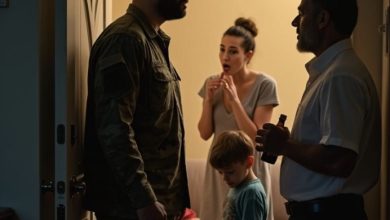After Her Divorce, My Sister-in-Law Moved In—and One Day She Threw All My Stuff Outside

I’ll never forget that hot summer afternoon when I pulled up in the driveway and saw garbage bags spilling with my things: clothes, shoes, photo albums, even my favorite coffee mugs. Everything I’d collected over the years was bundled up and left for the trash collectors. My name, Emma Carter, and my husband Daniel’s, were our life—our memories under that roof—but now they sat out on the porch as if we’d never lived there.
Daniel’s sister, Sophia, stood in the doorway behind me, arms folded, a smug look on her face. “You don’t live here anymore,” she announced. “This house is mine now.”
I stared at her in disbelief. Just weeks ago I’d welcomed her under my roof—after Daniel told me she’d been through a painful divorce, with nowhere else to turn. That night I’d shown her to the spare upstairs bedroom, given her towels and an extra set of sheets. I had no reason to suspect trouble. After all, she was family.
BUT OH, SHE DID NOT BEHAVE LIKE A GUEST.
From the start, Sophia criticized everything I did in my own home. She commented on how I cooked dinner—“You need more seasoning!”—and rolled her eyes when I dusted the shelves her way instead of mine. She rearranged the living room furniture without a word, even when I asked her not to. She borrowed my clothes and never returned them, raided my pantry, and treated my kitchen like a communal marketplace.
Her tone was always sharp. “If you did it my way, things would run more smoothly,” she told me. Or, “Daniel, you really shouldn’t let Emma make every decision.” Daniel would nod along as if her opinion held weight in our marriage, and I shrank back, trying not to cause a scene.
Then the remarks turned cruel. She started comparing me unfavorably to her: “When I was your age, I had a career and a home of my own.” She mocked my small garden. She sneered at my old couch. She tattled on me to Daniel if he wasn’t home: “Emma let the dishes pile up again,” she’d text him.
Despite my growing unease, I refused to complain. I was determined to be kind. If she needed a stable place to stay, I would do everything in my power. But every day brought another cut, another insult, another act of disrespect.
AND THEN IT GOT WORSE… WAY WORSE.
One afternoon, I stopped by a friend’s house after work. I was gone just a couple of hours. When I returned, the sight of my possessions on the porch stopped me in my tracks. Everything I owned was out there: my bookshelf’s worth of novels, my grandmother’s embroidered tablecloth, the set of china Daniel and I had bought for our wedding. Some of my things were stuffed into garbage bags, others thrown haphazardly into cardboard boxes.
I pounded on the door. “Daniel! Sophia! Open up!” I shouted, my voice cracking. But the door stayed locked. My hands trembled as I tried the handle, and finally it swung open.
It wasn’t Daniel who let me in. It was Sophia. She stood in the hallway, holding a wine glass like she was greeting me to her own party. “You’re home earlier than expected,” she said coolly.
“Why is all of my stuff on the porch?” I demanded. “Where’s Daniel?”
“He can’t explain now,” she replied, taking a deliberate sip. “He had to help me with some paperwork. He’ll be back soon.”
“Explain?” I repeated, coming inside. “Explain why you’ve claimed my home as your own?”
Sophia shrugged. “Your husband and I consulted a lawyer. Legally, half this house belongs to me. I have the documents right here.” She pulled a folder from her purse and tossed it onto our coffee table.
Shaking, I opened the folder. There, on legal-looking letterhead, was a deed transfer: the Carter family home, once owned by Daniel’s parents, was now jointly held by Daniel and Sophia. My name was nowhere to be found.
I looked at Daniel’s sister in horror. “You forged my husband’s signature?” I whispered.
“Legally, it wasn’t forged,” she said. “It was signed when we updated the title last month. You were off that weekend. Daniel told me we needed to include me on the deed because of his parents’ will.”
“But he never mentioned it!” I protested. “He never told me!”
Sophia’s smile was icy. “You weren’t part of the original family. You married into it. Legally, you have no claim.”
My heart pounded. The rest of our home had changed: my favorite photos had been replaced by pictures of Sophia and Daniel; my furniture had been rearranged; my kitchen was stocked with her groceries. It was like a hostile takeover—and I was living inside a stranger’s house.
My husband finally arrived, looking apologetic but firm. “Emma,” he said quietly, “this is just temporary. We need to sort out the legal details. You can stay with your parents for now, and I’ll get your things back.”
“Your parents?” I echoed, tears pricking my eyes. “You’re kicking me out of my own home?”
He winced. “I’m sorry. It’s the only way to keep the peace until this is settled.”
I sank to the floor, stunned. The sister I’d welcomed, the brother I loved—they had conspired to take everything away from me. I grabbed my purse and ran out, vowing in that moment that I would fight with everything I had.
That night I lay on my parents’ couch, unable to sleep. The betrayal burned in my chest. I didn’t know what to do, but I knew I wouldn’t let them win without a fight.
I called my best friend, Sarah—my own sister—and told her everything. Through tears, I made plans to see a lawyer. I gathered the paperwork: my marriage certificate, proof of my contributions to the home, photos of Daniel and me raising our kids under that roof.
The next morning, I marched back to the house. Sophia opened the door, expectation in her eyes. I extended a folder of documents. “I talked to a lawyer. We’re rescinding that deed. You can’t steal our home.”
Sophia’s face hardened. “Good luck with that,” she said, slamming the door in my face.
That was the last straw. I called my attorney and filed motions for an emergency injunction. I would not let anyone—blood or not—take what we had built together.
Sitting outside on the front step, I realized my life had changed forever. The home I thought was my safe place had become a battlefield. But I refused to back down. I would fight for my family, for my marriage, and for my right to the home I loved.
I drew in a deep breath and dialed my lawyer’s number. This was only the beginning.
The next morning, my lawyer, Ms. Patel, filed for an emergency injunction to freeze the deed transfer. She argued that I’d been married to Daniel before any “update” was signed, that our marriage and our kids gave me a legal right to the home, and that Sophia’s claim was invalid without my consent.
Within days, the court put a hold on the deed and ordered a full hearing. Meanwhile, I stayed with my parents but made daily trips back to the house, packing my things with the help of my friend Sarah. Each time I stepped through my front door, it felt like reclaiming a bit more of my life.
Daniel, desperate, tried to reach me. He left voicemails begging for forgiveness, promising Sophia had “taken advantage” of him. But I refused to answer. I needed space to think straight and to protect our children, who were now staying with my parents too.
At the court hearing, Sophia arrived looking composed. She claimed she’d simply enforced her “rights” as Daniel’s sister and that I’d “overreacted.” But when Ms. Patel calmly laid out months of rental receipts, family photos, utility bills in my name, and my equal contributions to the mortgage, the judge frowned. Even Daniel, called to the stand, stammered and admitted he’d signed papers under pressure without understanding them.
After two hours of testimony, the judge ruled in my favor. Emma and our two children regained full legal protection in the home. Sophia’s deed transfer was voided. The injunction became permanent, and the court ordered Sophia to vacate within ten days—or face a contempt charge.
That afternoon, Sophia packed her things—moaned about “family betrayal,” but left obediently under court order. Daniel stayed behind, tears in his eyes, finally realizing the depth of the harm he’d caused.
When I returned with the kids, we found the house a little dusty but still ours. We unpacked our belongings from storage bins, rehung our photos, and even let the kids choose new paint colors for their rooms—something we’d planned long ago but never got around to.
Daniel stayed on the porch, head bowed, as I set out the last box. When I finally turned to him, he offered a shaky apology. “Emma, I was a fool. I let her push me around. I’m so sorry.”
I nodded. “I need time,” I said softly. “But I’m willing to try—if you’re willing to show me you’ve changed.”
He took my hand. “I will,” he promised.
That evening, we cooked dinner together—simple pasta, a taste of the normal life Sophia tried to erase. As we sat on the back deck, candles flickering in the twilight, I felt at peace. The battle had been brutal, but it taught all of us a lesson in respect, boundaries, and what truly makes a house a home.
And yes, everything eventually fell back into place… but nothing will ever be the same again.










